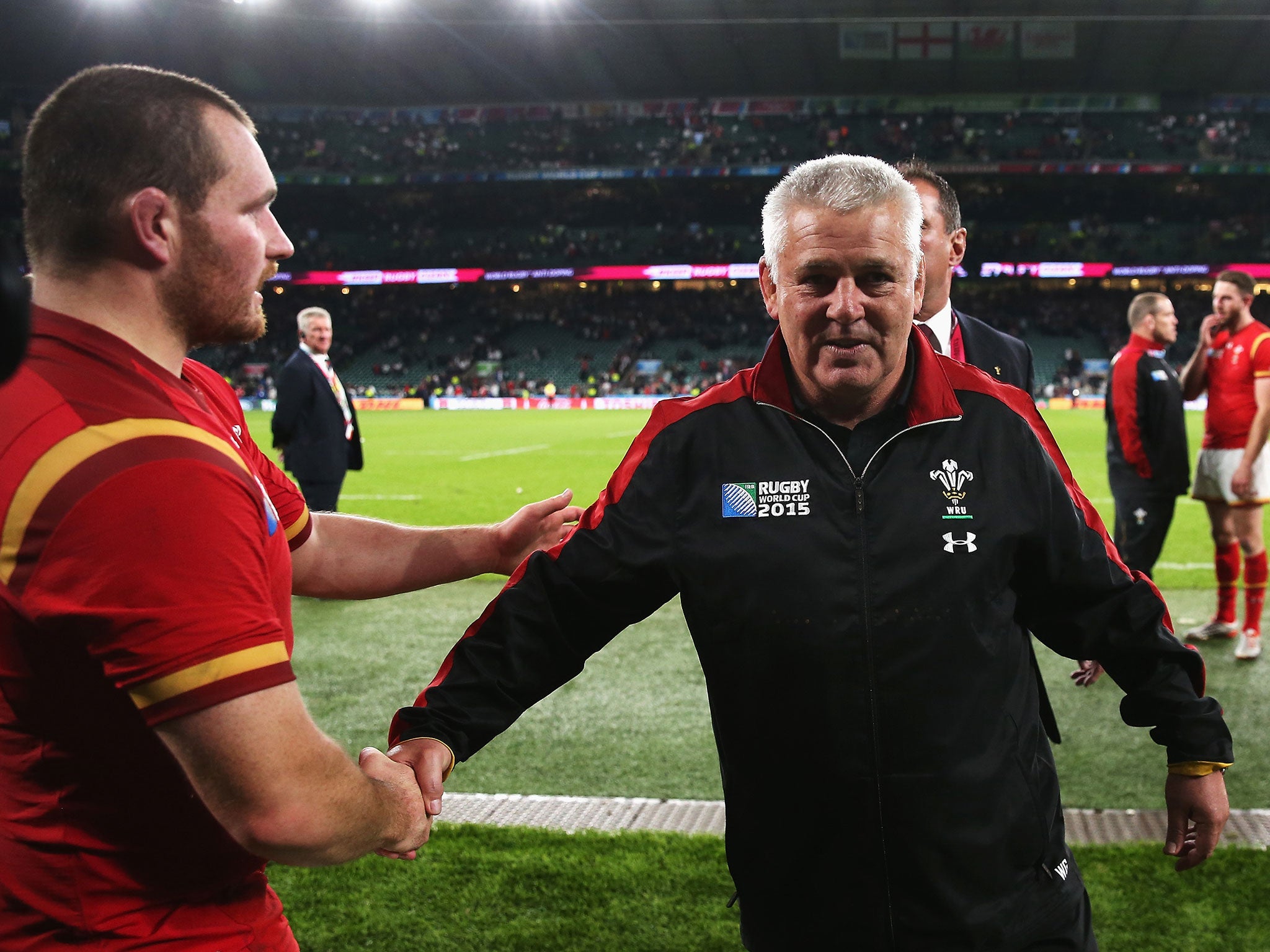RWC 2015: Warren Gatland may be a wanted man despite Wales exit
The positive view of Gatland is that by engineering umpteen near misses in these heavyweight matches, he has instilled a necessary toughness in Wale

Your support helps us to tell the story
From reproductive rights to climate change to Big Tech, The Independent is on the ground when the story is developing. Whether it's investigating the financials of Elon Musk's pro-Trump PAC or producing our latest documentary, 'The A Word', which shines a light on the American women fighting for reproductive rights, we know how important it is to parse out the facts from the messaging.
At such a critical moment in US history, we need reporters on the ground. Your donation allows us to keep sending journalists to speak to both sides of the story.
The Independent is trusted by Americans across the entire political spectrum. And unlike many other quality news outlets, we choose not to lock Americans out of our reporting and analysis with paywalls. We believe quality journalism should be available to everyone, paid for by those who can afford it.
Your support makes all the difference.As England very quickly discovered, the end of the World Cup road comes with inevitable conjecture over the future of the driving forces. It would be no great surprise if there were other teams, including the one run from Twickenham, glancing covetous eyes towards the Wales head coach Warren Gatland and his English defence coach Shaun Edwards, even though the Welsh record against the southern hemisphere big three in the eight-year Gatland era is dire: played 30, won two.
The positive view of Gatland is that by engineering umpteen near misses in these heavyweight matches, he has instilled a necessary toughness in Wales, with Edwards’ rush defence making South Africa work terrifically hard for a return of a single try in the 23-19 quarter-final loss at Twickenham on Saturday. But would a little of the old Welsh way of elusive running and beating a man actually have seen them through into a second World Cup semi-final in a row?
“Shaun Edwards is a magnificent coach and a wonderful guy and he’s got the best out of us defensively,” said Jamie Roberts, the Wales centre, who will take a break from professional rugby now with Cambridge University before joining his new club Harlequins in December.
“The guys putting their bodies on the line was amazing to watch. I hope the coaching team stay together. I think it’s a great mix of characters and styles of coaching that the boys really enjoy. They bring out the best in the players but we’ll see what happens. It’s less than four months until the Six Nations kicks off and that’s something we desperately want to win again.”
For South Africa, who now meet New Zealand at Twickenham on Saturday in their fourth World Cup semi-final in six attempts, Fourie du Preez’s clever “from the playsheet” move on the short side of a scrum in the 74th minute made the difference.
Wales were clinging grimly to a 19-18 lead, after Dan Biggar had kicked 14 points including the conversion of the try he made for Gareth Davies with a chip and gather.
“We’ll look back and reflect on a tough group with Australia and England,” said Roberts, “and it was one we’ve done very well to get out of. Unfortunately that last try has killed us.”
You couldn’t quite say Du Preez didn’t put a foot wrong: he stood on Bismarck du Plessis’s hand, causing a “nasty laceration” which means the hooker as well as the second row Lood de Jager (foot tendon) are doubts for Saturday. The next men in would be Adriaan Strauss and Pieter-Steph du Toit.
But the scrum-half and captain, who had to be persuaded by coach Heyneke Meyer to come back from club rugby in Japan to bolster the Springboks, was one of half a dozen thirtysomethings in the squad whose experience was invaluable, not least in recovering their poise after the opening-weekend loss to Japan.
“In South Africa if you’re 32 you’re ancient, aren’t you?” Schalk Burger, the long-serving flanker, commented sarcastically. “I haven’t been feeling that old, and it was lovely to be out there at Twickenham, an amazing venue. We need youth, we need energy, and there were a lot of youngsters that played their first World Cup quarter-final.
“But I think in big situations you also need a few old heads. We’ve pretty much seen it all in rugby, the senior corps of this team. The big thing was composure and we steered the ship well.
“Let’s be honest, the week or two weeks after Japan was probably my toughest in a Springbok jersey and I have been there for 13 years. There was a lot of introspection; our backs were against the wall. The South African media is pretty ruthless. It brought the team closer together and we understand now the way we want to play and win matches.
“A big thing was composure. We knew the game would be won in the last couple of minutes, to believe in what we’ve got, not try anything different. The physical nature was right up there with any southern hemisphere match, the way Wales defend coming off their line. There’s no way around their rush, the only way is to go through it, and that means there were a lot of big collisions.”
Join our commenting forum
Join thought-provoking conversations, follow other Independent readers and see their replies
Comments